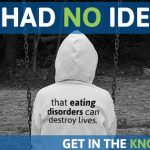General

A recent campaign by Dove reveals that others probably describe you as a happier, prettier version of yourself than you do. Dove Real Beauty Sketches campaign is in sync with the brand’s previous efforts toward showing “real” women in commercials and promoting the idea that all shapes and sizes are beautiful. “Women are their own …
Read More

Most U.S. citizens spend meal time alone, according to a new report from research firm NPD Group. The findings may be particularly significant for individuals with eating disorders, as solo eating is a behavior that can be problematic for binge eaters, stress eaters, or bulimics. According to the research, 57 percent of Americans eat meals …
Read More

Feb. 23 marks the beginning of National Eating Disorder Awareness Week 2014, but it’s not too early to start thinking about how you can participate. The theme this year is “I Had No Idea,” which aims to raise awareness about how hidden and secretive most eating disorders are and to educate the public on how …
Read More

In Australia, it’s more dangerous to have an eating disorder than to hop in the car for a long road trip. In a report commissioned by the Butterfly Foundation, an organization that supports Australians with eating disorders, an estimated 1,828 people died from eating disorder-related deaths in 2012–a number that was about 50 percent higher …
Read More

A link between eating disorders and several autoimmune diseases has been discovered by Finnish researchers, suggesting that eating disorder risk could be higher in people with conditions like type 1 diabetes or inflammatory bowel disease. The study, which was conducted by researchers at the University of Helsinki, aimed to address the prevalence of autoimmune conditions …
Read More

Adolescent females with eating disorders have yet another health issue they may have to grapple with once they’re ready to have children: reproductive problems. A new study from the University of Helsinki found that the likelihood for miscarriage in women with binge eating disorder (BED) was more than triple that of women who do not …
Read More

While previous studies have shown a link between eating disorders and depression, research on how athletes are affected by these conditions has been somewhat conflicting. A study published in the Journal of Sport Sciences found that body image pressures faced by athletes could lead to depressive tendencies, as well as regimented eating habits that could …
Read More

As college students start making their way home for winter break, experts say it’s a good time for parents to look out for eating disorders. Recent statistics from the National Institute of Mental Health estimate that about 25 percent of college students have patterns of disordered eating, and that the same percentage of college women …
Read More

Anorexia and bulimia traditionally evoke thoughts and images of young, middle- to upper-class teen girls. But in a new book called “Midlife Eating Disorders,” Cynthia M. Bulik says that eating disorders are actually more common among older women in their 30s and 40s. These woman, often shouldering the burdens of work, family and home while …
Read More

As students head back to school for winter semester, New Year’s resolutions may be fading – but spring break looms near. And according to a recent report from the University of Alabama, it’s the prime time for eating disorders to flare up on college campuses across the nation. Nutritionist Sheena Gregg, assistant director of health …
Read More
 Eating Disorder Self Test. Take the EAT-26 self test to see if you might have eating disorder symptoms that might require professional evaluation. All answers are confidential.
Eating Disorder Self Test. Take the EAT-26 self test to see if you might have eating disorder symptoms that might require professional evaluation. All answers are confidential.
Find a Treatment Facility Near You
Click on a state below to find eating disorder treatment options that could be right for you.










 Eating Disorder Self Test. Take the EAT-26 self test to see if you might have eating disorder symptoms that might require professional evaluation. All answers are confidential.
Eating Disorder Self Test. Take the EAT-26 self test to see if you might have eating disorder symptoms that might require professional evaluation. All answers are confidential.